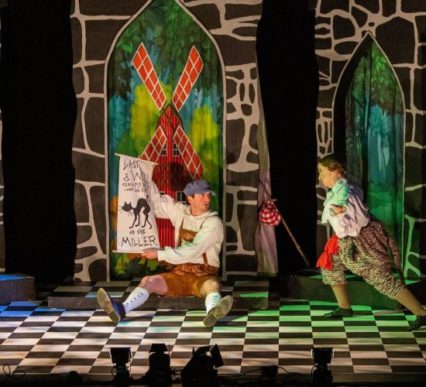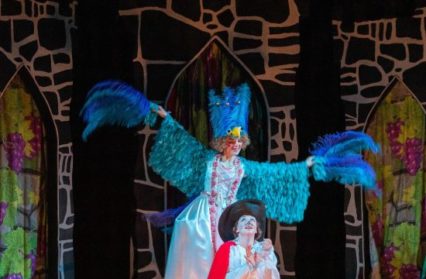Mid Wales Opera resurrects a work about a much-loved fairy-tale character and once again shows audiences how the core of music theatre does not depend on trappings grand or remote. Nigel Jarrett was there for Wales Arts Review.
Puss in Boots has leapt beyond feline curiosity to scary pro-activity. He’s a cat in a hat as well as in footwear. He’s not only self-protective but also deviously anthropomorphic, qualities needed if he is to engineer the marriage of his master the Miller to the King’s daughter. Treading the pantomime boards on two feet for an eternity, he was just waiting to be an opera star, and in 1948 his time arrived in El Gato con Botas, a short and sharp work by the Spanish composer Montsalvatge.
Mid Wales Opera has taken him on tour as its autumn SmallStages presentation, demonstrating yet again how much miniaturised repertory there is to be adapted for theatres and audiences in Wales where opportunities for attending large-scale opera productions are limited. That such shows need not be ‘grand’ in the sense of Meyerbeer’s L’Africaine illustrates why, in theory, most operas at a stretch could be reduced to its principals – and its principles. Less, when not more, is often sufficient.
The MWO team of director/designer/translator Richard Studer and music director Jonathan Lyness has brought aesthetic and practical pruning to fine art. Not the least of the company’s virtues is its choice of often young and rôle-hungry singers; so that in this production as in many others the drama resides firmly with them. Reduction of the full score by Lyness – in this case to piano (Lyness himself), violin (Elenid Owen), trumpet (Jac Thomas), bassoon (Alanna Pennar-McFarlane), and percussion (James Harrison) – is a transformation into something effective, always to the point, and unique in itself. Studer’s set of three flats with curtained entries/exits suffice for sometimes amusing choreography.
firmly with them. Reduction of the full score by Lyness – in this case to piano (Lyness himself), violin (Elenid Owen), trumpet (Jac Thomas), bassoon (Alanna Pennar-McFarlane), and percussion (James Harrison) – is a transformation into something effective, always to the point, and unique in itself. Studer’s set of three flats with curtained entries/exits suffice for sometimes amusing choreography.
Economies of scale therefore combine with economy of means. Moreover, El Gato is probably the most straightforward story MWO has dealt with so far; in fact, it’s not much of a musical distillation at all, given a plot already so lean as not to require much more than the level to which Lyness has transposed the score and the nuances which Studer brings to his translation of Néstor Luján’s libretto. Spare lighting by Bridget Wallbank makes the production intimate and cabaret-like. Such close contact might have encouraged more audience participation than there was at this final outing of the tour in Brecon, an addition to the itinerary following cancellation of a performance at the Abergavenny Borough Theatre, where renovation is still incomplete. Indeed, Studer’s on-stage welcome and introduction invited hiss-boo responses to the evening’s goings-on.
The opera is through-composed, despite moments when the band could have hovered in expectation of applause, the bane of an opera conductor’s evening except where it’s a surprise if it’s withheld. But this isn’t Tosca or Turandot. Trevor Eliot Bowes’s entrance as the Ogre might have attracted a few sibilants as a prelude to more insistent expressions of dislike; but then, there’s nothing in the story so far to suggest that he’s an impediment to the Cat’s cunning plan: faking the Miller’s drowning in order that his salvation will lead to the aforementioned marriage. The ‘drowning’ scene is accomplished with a spray of soap bubbles and some slo-mo flailing by Huw Ynyr’s Miller, and the arrival by ‘coach’ with a jolt of Philip Smith’s King and Alys Mererid Roberts’s Princess, for whom the ‘victim’ has already been portrayed as the ‘Lord Marquis de Carabas’ and the source of a love letter and the gift of a rabbit. (It’s amazing how many have heard of Puss in Boots but know nothing about Charles Perrault’s 1697 fairy tale.) Having seen the Ogre transform himself into lion, parrot and mouse – some nice costume changes here – the wily puss pounces; thus is the Orgre’s palace freed for occupation by the married couple, and Martha Jones’s wily cat (a fur-trousered rôle), becomes a lord.
Studer makes no attempt to even hint at an overt moral tone, such as suggesting that if you’re poor the fastest way of fleeing destitution is through imaginative lies and deceit. That’s because the mythical stock character of Talking Animal as Partner-in-Mischief is a clanger and suggests that amelioration is impossible. Best go for an inspired take suggesting a comic re-write of something out of Wagner. If only we had access to a hitherto dumb creature that talks, devises, and takes avoiding action. A human one would work, but it wouldn’t be the same.
As has now become practice for MWO with short operas, the second half was given over to the singers and musicians in pursuit of related themes. Each had a solo role and among the items was the Evening Prayer from Humperdinck’s Hansel and Gretel, which is MWO’s tour opera next Spring. Britten, Harold Arlen and Sondheim featured prominently, and the final company ensemble of Sondheim’s Into the Woods was the rousing encore. Only with a small number of companies of MWO’s sort does one experience so much presented so entertainingly for so many by so few.
Nigel Jarrett is a regular contributor to Wales Arts Review. He won the Rhys Davies Prize and the Templar Shorts Award, both for short fiction. His sixth book, a fictional memoir, is Notes From the Superhorse Stable; it appeared this year from Saron Publishers. His fourth story collection, Five Go to Switzerland, is about to be published by Cockatrice Books.



 Enjoyed this article? Support our writers directly by buying them a coffee and clicking this link.
Enjoyed this article? Support our writers directly by buying them a coffee and clicking this link.







